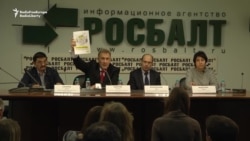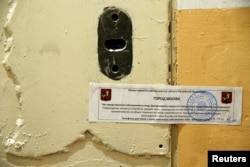Amnesty International says Russia's controversial "foreign agents" law is an "assault on freedom of expression" that has caused dozens of NGOs to curtail their operations and others to shut down.
"The 'foreign agents' law was designed to shackle, stigmatize, and ultimately silence critical NGOs," said Sergei Nikitin, director of Amnesty International Russia, in a statement released on November 18.
In a report, Amnesty marks the nearly four years since the severe law came into effect and shows the damaging effects the legislation has had on Russian NGOs.
"It is pretty clear that the main aim of the Russian authorities has been to stifle the growth of a critically engaged civil society and replace it with docile, dependent supporters of government policy," Nikitin said. "This scorched-earth approach to civil society is not in Russia’s best long-term interests."
WATCH: Amnesty International comments on Russia's 'foreign agents' law
The report says nearly 150 NGOs operating in Russia have not only had their budgets reduced, but their reputations impaired and staff members intimidated.
It adds that critical monitoring of the Russian government has been severely reduced because of the legislation.
'Ultimate loser'
Nikitin said the foreign agents law had damaged "individual rights and the quality of civic discussion in Russia."
He also said that by harming NGOs operating in the country, the law made Russian society the "ultimate loser."
Amnesty says a total of 148 organizations have been put on the "foreign agents" register and that 27 of those have had to close, mostly for financial reasons.
NGOs can be declared "foreign agents" by Russia's Justice Ministry, after a court's approval, if they are deemed by the ministry to be engaged in "political activity" and have received some funding from abroad.
Amnesty adds that 19 of the groups that were put on the list did actually prove they had not accepted any foreign funding. But they all still remain on the list with a designation that they had "stopped performing the functions of a foreign agent."
Amnesty International's Russian office said it had researched the effects the law had on more than a dozen NGOs added to the "foreign agents" list and conducted interviews with their staff.
The NGOs examined had investigated a range of issues, from environmental protection NGO Bellona-Murmansk and prison-reform group Pravovaya Osnova (Legal Basis) to a Novosibirsk-based consumer-protection foundation and the lesbian, gay, bisexual, and transgender (LGBT) rights group Maximum.
Moscow office reopened
The Amnesty report concludes that the Russian government is attempting to replace the shutdown and damaged NGOs with "more compliant" organizations to create "an illusion of" a vibrant civil society.
The report recommends that Russian officials immediately suspend the "foreign agents" law and acknowledge the vital role that NGOs and human rights groups occupy in society.
It also says authorities should ensure the security of NGO workers and human rights defenders in Russia, who are often the victims of harassment and violent attacks.
Meanwhile, the Russian branch of Amnesty International said on November 18 that the doors to its Moscow offices had been unsealed -- more than two weeks after employees were evicted by city officials from entering the offices in what Moscow authorities said was a rental dispute.
Nikitin said there had been a "technical mix-up," and he had signed a new lease with the capital's State Property Department.







